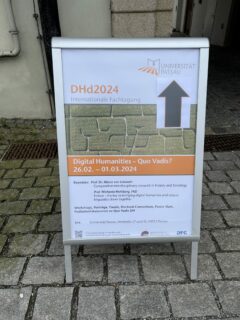A Report from the #DHd2024
This year’s conference of the association “Digital Humanities in German-speaking countries” (DHd) took place in Passau from February 26th to March 1st, 2024, which marked the DHd conference’s 10th anniversary! By the way: The first conference also took place in Passau. The conference’s motto was “Quo Vadis?” (Where are you going?) and therefore asked explicitly about the future of the Digital Humanities: “After a decade, the DHd2024 now offers the opportunity to take stock and develop future perspectives within the discipline” (translated from the Call for Papers). Spread over five days, current topics and projects were presented and discussed in workshops, panels, lectures, doctoral consortia and a poster session.
On Monday, participants discussed “How to do Theory: Reflexive Practices in DH Teaching” in a workshop; the workshop was organized by the AG Digital Humanities Theory and also included a panel in which Dominik Kremer from the DHSS took part. Another workshop was entitled “Networked research data – who knows who in the Middle Ages?”; participants learned how to reuse research data, integrate it into a graph database and use it to analyze relationships between different actors. Data from the “Regesta Imperii” project was used for this purpose.
On Wednesday and Thursday, thematically structured sessions followed with lectures on digital cultural heritage, workflows with LLMs (Large Language Models), digital musicology, texts and language, multimediality, research data, computational literary studies or DH theory and history. In this session, Dominik Kremer and Sabine Lang from the DHSS gave a talk on “Konzepträume: Ein Vorschlag zur besseren Abstimmung von Theoriehintergrund und digitalen Datenanalysen” (click here for the abstract).
The DHd 2024 started officially on Tuesday with a keynote speech by Prof. Dr. Marco van Leeuwen from Utrecht University; the historian and sociologist spoke about the role of theory, methods, data, and collaboration in the disciplines of history and sociology using examples from his ERC project “Towards Open Societies”. The closing keynote was given by Prof. Dr. Michaela Mahlberg, who will come to the DHSS from April 1st. In her keynote, she also discussed the potential of a collaboration between digital humanities and corpus linguistics and outlined this by using the example of the study of the literary genre of fiction.
Further information:
The DHd 2025 is organized by Bielefeld University and the University of Applied Sciences and Arts (HSBI)
The DHd 2026 will take place in Vienna
Link to the Book of Abstracts: https://zenodo.org/doi/10.5281/zenodo.10686564
